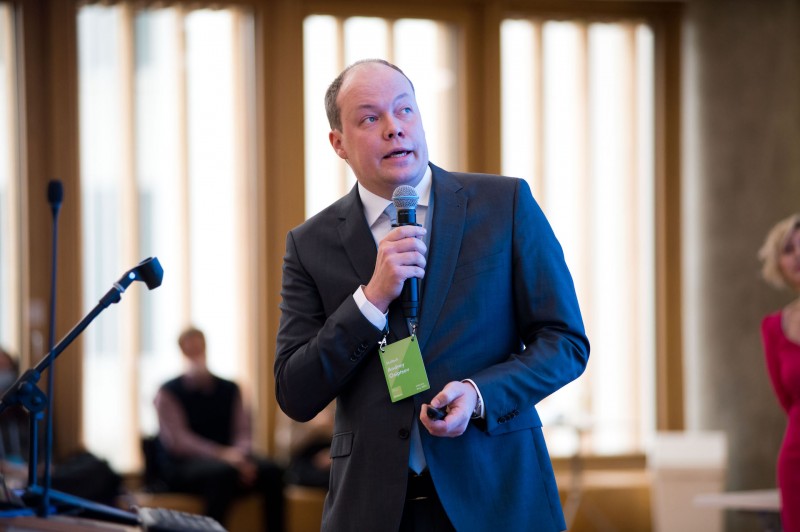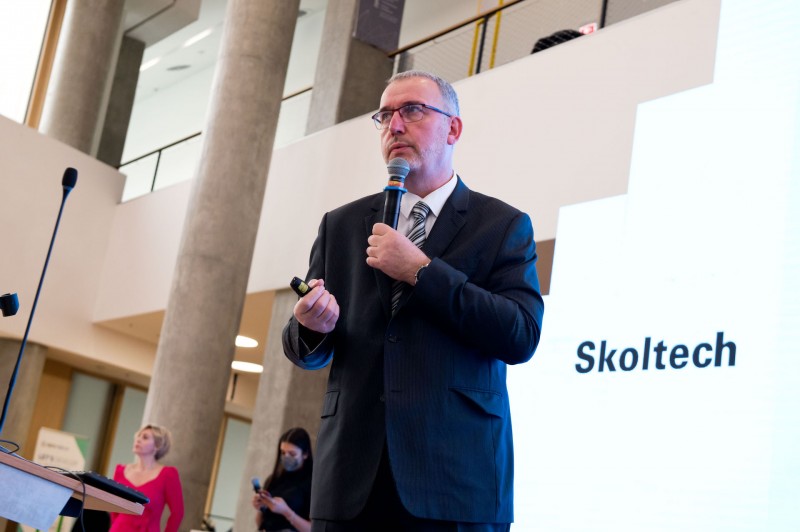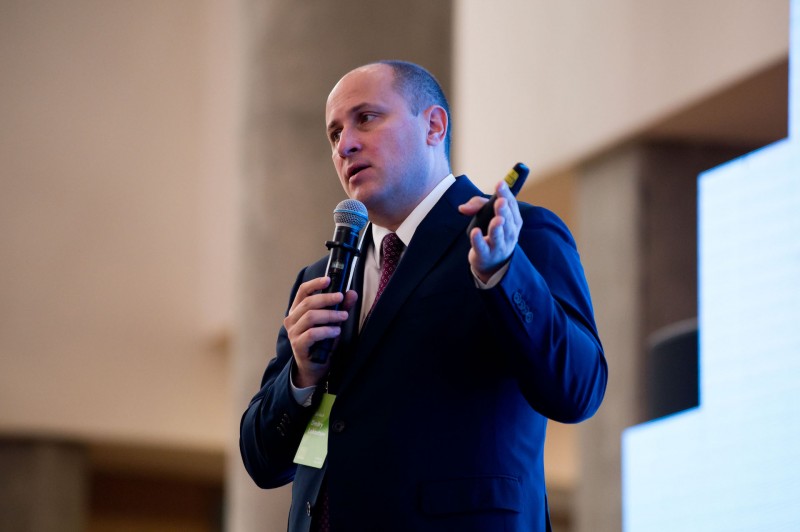Held Wednesday, the Industry Day at Skoltech featured presentations of the Institute’s three new project centers, previously announced to the community at an all-hands meeting in September. The new type of center emphasizes problem-driven research, prototype development, and technology scaling and transfer toward industrial applications in Russia in areas where Skoltech has attained excellence: sustainable energy, agrotech, and wireless communication.
The Industry Day opened with a plenary session, where Skoltech President Alexander Kuleshov spoke about the ongoing changes in the Institute’s business model: “For six years, our industrial activities have grown more or less 25% per year. It means exponential growth. But now this model is exhausted. We used to sell our competences. Now we have to start selling our intellectual property.” The president called this the Institute’s main goal for the next five years, highlighting the research areas where the new project centers will be active.
Two presentations by Skoltech’s industry partners followed. Mars Khasanov, the director of science at Gazprom Neft, discussed the technological opportunities available to companies in the face of the energy transition, including intelligent materials design, augmented intelligence, and more. IRE-Polus General Director Nikolay Evtikhiev took over the floor for an inspiring appeal to students, pleading for a more holistic model of a researcher integrating fundamental science and engineering, adding that the industry “needs new Maxwells.”
The meeting’s chief organizer, Head of Industrial Studies Zhanna Turubarova from the Skoltech Education Department introduced the speakers presenting the new project centers for ESG, agro and wireless technology to highlight the domains where Skoltech is taking leadership as it moves to a new stage in its development.

Photo. Andrei Osiptsov, the head of the newly established Project Center for Energy Transition and ESG at Skoltech. Credit: Skoltech
- The head of the Project Center for Energy Transition and ESG, professor Andrei Osiptsov spoke first. He pointed to the prospects of carbon border tax announced by the European Commission, as well as the broad consensus among scientists that nations need to join forces and develop technologies for mitigating the increase in atmospheric carbon dioxide to attain the sustainable development trajectory.
Osiptsov went on to name the three pillars of the new center’s research. The primary focus is on decarbonization of industry with existing energy sources. Broadly speaking, this involves emission monitoring and carbon capture, utilization, and storage. The second core area is ESG risk evaluation and management for the banking industry. Finally, the third priority area is renewable energy and hydrogen technology.
The new project center’s director also noted the current and planned collaborations with other Skotech centers (e.g., on energy efficiency and AI), Sber (ESG risk management), MSU (underground CO2 storage simulation), the New Economic School (educational programs), the institutes of Oceanology and of Global Climate and Ecology of RAS (carbon emission monitoring).
In closing, Osiptsov pointed out that industry needs more specialists with specific training in sustainable development and ESG. In response to this growing demand, the New University League, which includes Skoltech, has developed the continuing professional education program “Integration of ESG Factors: From PR Strategy to a Value Chain.”

Photo. Laurent Gentzbittel, the head of the newly established Project Center for Agro Technologies at Skoltech. Credit: Skoltech
- The head of the Project Center for Agro Technologies, Laurent Gentzbittel referred to agro as potentially “a new oil in Russia.” He said: “There are outstanding opportunities for agro in Russia. Agriculture is already an important share in the Russian GDP, if we compare it to other blocs like Canada or the EU. Exports bring back revenues — something like 21 billion euros [$24.4 billion] in 2019. Russia produces about 20% of the global wheat export. We think that a six- to seven-time improvement in revenue is doable if we compare the Russian export of agroproducts with the EU: We can go from 21 billion euros to something like 119 billion euros [$138.2 billion].”
Examining the features of the agri-food chain in Russia, Gentzbittel pointed out the main challenge his center is going to address. The agro-supply segment of the chain is dominated by foreign companies, fertilizer producers aside. “We produce commodities, but we import technologies,” he explained. “In some crops, 90% of technology is imported.”
To tap into the potential of high-tech agriculture for Russia, the center will pursue approaches such as genomics-assisted breeding, which has recently produced new plant varieties with up to 30% higher yields in another BRICS country, India. A further focus will be on digitalization: yield prediction for agro-holdings, computer vision for plant disease detection or plant growth monitoring, databasing and IoT for animal trait analysis, and so on.
“We now have a center with strong business integration and the key equipment: sequencing technology, mass-spec, high-performance computing. We have a strong network of international collaborators,” Gentzbittel recapped, emphasizing the problem-driven approach in an appeal to industry partners. “We will address your problem. You will ask your questions, and we will develop the research programs to answer them.”

Photo. Dmitry Lakontsev, the head of the newly established Project Center for Next Generation Wireless and IoT at Skoltech. Credit: Skoltech
- The head of the Project Center for Next Generation Wireless and IoT, Dmitry Lakontsev said, “Our center itself, the achievements of our center — they rest on three mighty pillars that signify our competence, our stable foundation, and our entanglement in the vibrant fabric of the economy: Research and Development (R&D), Russia’s National Projects, and a flesh-and-blood link to the demands and interests of the entire industry. Our aim right now is to be the best R&D team in Russia, and obviously one of the best R&D teams in wireless communication in the world. Together with its industry partners, Skoltech is the leader in Russia,” the director added. Among the partner companies are Huawei, MTS, Rostelecom, Beeline, and Micran.
The center will develop 5G software and equipment prototypes and develop brand-new technologies for 6G deployment to bypass the global vendors and deploy networks based on Russia’s own capabilities. Another issue to be addressed is the lack of qualified personnel for 5G and 6G development. The center will also work on introducing more AI into telecommunication systems and networks: At some point, all battery-powered end devices will have some AI embedded in them.
Lakontsev cited novel view synthesis approaches as an example of the center’s research results. These could be useful for machine learning and deep learning applications as a source of training data: Based on two dozen photos taken from different angles, a 3D model of a person can be created to then generate views from other angles for use as training data.
The presentation concluded with a photograph emblematic of Skoltech’s 5G breakthrough. It shows a connection speed test run on a smartphone connected to the Institute’s own 5G network, which uses Russian technology. It reads: 1,136.34 Mbps!
